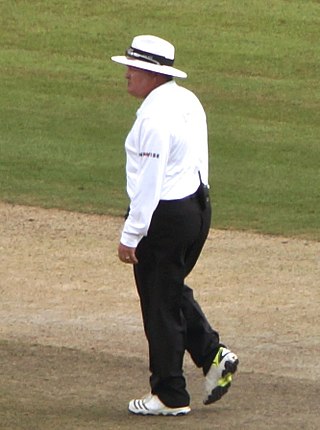Related Research Articles

The Kenya men's national cricket team represents the Republic of Kenya in international cricket. Kenya is an associate member of the International Cricket Council (ICC) which has Twenty20 International (T20I) status after the ICC granted T20I status to all its members.

The United Arab Emirates men's national cricket team is the team that represents the United Arab Emirates in international cricket. They are governed by the Emirates Cricket Board (ECB) which became an Affiliate Member of the International Cricket Council (ICC) in 1989 and an Associate Member the following year. Since 2005, the ICC's headquarters have been located in Dubai.
The Canada national cricket team represents Canada in international cricket. The team is administered by Cricket Canada, which became an associate member of the International Cricket Council (ICC) in 1968.

The Netherlands men's national cricket team, usually referred as "The Flying Dutchmen " is a team that represents the Netherlands in men's international cricket and is administered by the Royal Dutch Cricket Association.

The East Africa cricket team was a multi-national cricket team representing the countries of Uganda, Kenya, Tanzania and Zambia. Their first game was against Rhodesia in 1951. East Africa appeared in the 1975 World Cup and the 1979, 1982 and 1986 ICC Trophies. In the last two of these Kenya was represented in its own right, so that East Africa was effectively a Ugandan, Tanzanian and Zambian team.
Gazi Ashraf Hossain, also known as Lipu, is a former Bangladeshi cricketer who captained the Bangladesh national cricket team in its first seven One Day International (ODI) matches, two in the 1986 Asia Cup, three in the 1988 Asia Cup, and a further two in the 1990 Austral-Asia Cup.

The Tanzania national cricket team is the men's team that represents Tanzania in international cricket. Cricket has been played in what is now Tanzania since 1890, and the national side first played in 1951. The Tanzania Cricket Association became an associate member of the International Cricket Council (ICC) in 2001, having previously been part of the East and Central Africa Cricket Conference, which was a member of the ICC in its own right.
Alex Auma Obanda is a Kenyan cricketer who has played first-class cricket for Kenya Select.
The Nairobi Club Ground is a multi-use sports venue in Upper Hill, Nairobi, Kenya. It is the second oldest cricket ground in Kenya, having been predated by the Sir Ali Muslim Club Nairobi which opened in 1934. The Nairobi Club lays claim to being the first cricket ground to feature a turf wicket when it opened in the early 1950s, which was installed by former club cricketer for Prestwich in the United Kingdom, and Nairobi Parks Department employee, Don Pringle who later represented East Africa in the 1975 Cricket World Cup.

Marais Erasmus is a South African former first-class cricketer who is currently serving as an international cricket umpire. He is a member of the Elite Panel of ICC Umpires and stands in matches in all three formats of international cricket – Test matches, One Day Internationals (ODIs), and Twenty20 Internationals (T20Is).
Farooq Kirmani is a former international cricketer who represented the Canadian national team between 1982 and 1991. He was born in Pakistan, and played at first-class level there before emigrating to Canada.
Ashish Vinod Karia is a Kenyan former first-class cricketer.
Alfred Boy Njuguna is a Kenyan former first-class cricketer and coach of the Kenya national cricket team.
Bharat Shah is a Kenyan former first-class cricketer.
Cleophas Udoyi is a Kenyan former first-class cricketer.
Muslim Kanji was a Kenyan first-class cricketer.
Daniel Macdonald is a Kenyan former first-class cricketer.
Naguib Verjee is a Kenyan former first-class cricketer.
Jeshani Mansukh Naran is an Indian-born Kenyan former cricketer.
Ramesh Premji Mepani is an Indian-born Kenyan former cricketer.
References
- 1 2 Pier, Meg. "Kenyan Eco-Architect Hitesh Mehta & the Web of Life". www.peopleareculture.com. Retrieved 20 September 2021.
- ↑ "ICC Trophy Matches played by Hitesh Mehta" . CricketArchive. Retrieved 20 September 2021.
- ↑ "First-Class Matches played by Hitesh Mehta" . CricketArchive. Retrieved 20 September 2021.
- ↑ "Kenya v Pakistan Starlets, 1986" . CricketArchive. Retrieved 20 September 2021.